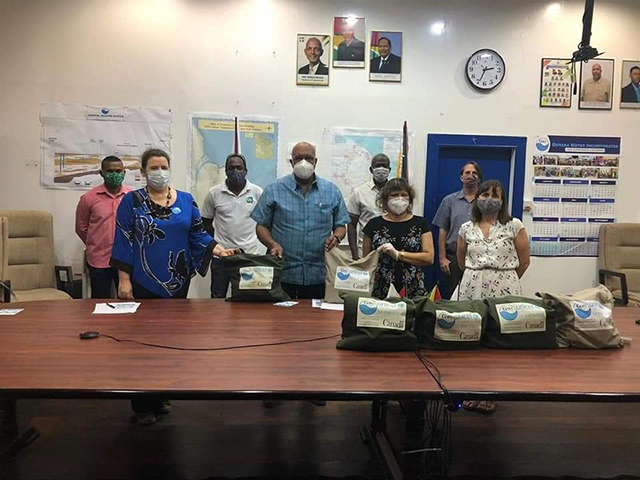The Guyana Water Incor-porated (GWI) on Thursday received 1200 care packages/hygiene kits to be distributed to Venezuelan migrants and locals of Region One to help stop the spread of COVID-19.
In a press release yesterday, GWI says that this gesture comes on the heels of a collaborative effort among the Canadian High Commission of Guyana, UNICEF and the water utility to improve sanitation conditions in Regions 1 and 7, through the construction of Ventilated Improved Pit Latrines (VIP) and hand-wash sinks.
According to GWI Consultant, Dr. Darren Shako, approximately 60 VIP toilets have been constructed in Region One and residents there also previously benefitted from sanitation training and a set of hygiene kits.
He also noted that the project among the three entities was recently expanded to cater for the hygiene kits in light of COVID-19.
GWI’s Managing Director Dr. Richard Van West-Charles said when the utility was approached by UNICEF to execute the works, there was no hesitation, as the initiative coincided with the utility’s efforts and President David Granger’s call for equity between the coastland and hinterland.
He added that GWI has just completed a squatters’ analysis to improve water access in those communities and is working on schools to ensure their water supply is in a state of readiness when they reopen.
Canadian High Com-missioner, Lilian Chatterjee described the effort as the perfect collaboration. She said that while the commission donated approximately $7.2M, it relies on local agencies like GWI and implementing agencies like UNICEF for their expertise.
UNICEF’s Country Representative com-mended GWI for work done in Region One to improve water supply, noting that the well drilled in Kamwatta reached a record-breaking depth after numerous attempts. She said that other Regions will also be benefitting from care packages.
The care packages include sanitary napkins for females, deodorant, soap, toilet tissue, sugar, rice and other necessities, as well as an information card in both English and Spanish for the population.







